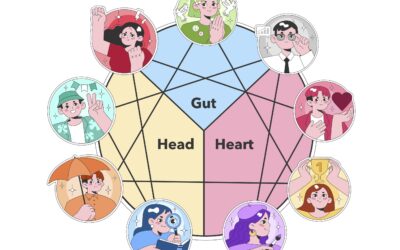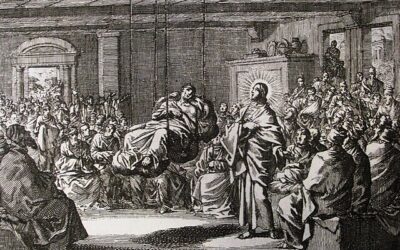What I love about Ecclesiastes
by Anne Basye
MY MOM KEEPS A TO-DO LIST. It shows everything she is going to do the rest of her life.
When my son wrote these words in a long-ago grade school essay, I was pleased… and uneasy. His assignment was to recommend me for a job with the president. Overall, he was complimentary. He called me kind and talented and described a few of my better qualities. This one was double edged: She is very organized. Let me emphasize that.
LIST-DRIVEN, RESPONSIBILITY-BURDENED
He was right. The to-do list that kept me organized also snatched me away from the present so that, instead of appreciating what was happening in the moment, I worried about how I was going to finish my list. My son got plenty of my attention, but he knew not to get between me and my list or I’d be irritable.
He also knew that my list was never finished. Like an ancient vellum scroll, it was always unspooling. While I handled one day’s tasks, the tasks of tomorrow were accumulating in the unrolled part of the scroll, which never got any thinner. At the end of the day, was my day really done? Was there more to do? Had something been overlooked? Could I rest? I was so determined to be organized that it could be hard to relax, let go and live—a state of mind that may sound familiar to you too, or to anyone living in our productivity-mad culture.
Nine years ago, in a Gather piece that explored the tension between doing and being, I wrote about my problematic relationship with my to-do list and how I was trying to get better at non-doing. I ventured, on the page, that as an empty-nester, “the busiest, most list-driven part of my life is behind me.”
How wrong I was!
I’m as busy and distracted as never. In place of parenting duties, today there are work projects, volunteer obligations, hikes, time with friends, house and garden tasks for my place and my family’s farm and, in a column labeled “California,” tasks to manage between visits to my 93-year-old mother 840 miles away.
My life is rich, but I still sometimes feel anxious about responsibilities. That’s especially true right now because Mom fell recently and broke her hip. I’m totally in the present when I’m with her in rehab, listening, cheering her on as she learns to walk again, lending a hand when she asks for one. But in her empty house, I wander from room to room, worrying about what happens next. Can she live here again? How do we make that happen? When the end comes, how will we let go of this place that has been home to my grandparents and parents for more than 80 years? How do my siblings and I care for and say goodbye to Mom as a team, without me and my to-do list taking over?
These are real what-ifs about real tasks that await us in the future, but they keep me from enjoying time with Mom right now.
A TIME FOR EVERYTHING
The writer of Ecclesiastes seems to have felt the same way. This is a guy who tackled a massive to-do list of great works: building houses, planting vineyards, making gardens and parks, buying herds and flocks, gathering treasure and becoming “greater by far than anyone in Jerusalem” (2:9; all Scripture quotes NIV). His life to-do list occupies many years and thousands of workers, and when he gets to the bottom of it, the pleasure he gets is short lived.
In this writer I find a kindred soul. Here is someone in midlife wrestling with what being a human is all about. “Laughter … is madness. And what does pleasure accomplish?” (2:2). Wine doesn’t work. While his to-do list leads to great success and self-satisfaction, he doubts its worth: “Yet when I surveyed all that my hands had done and what I had toiled to achieve, everything was meaningless, a chasing after the wind; nothing was gained under the sun” (v. 11).
So he starts a new to-do list, this time focused on the meaning of life. He will consider “wisdom, and also madness and folly” (v. 12). A writer like me, he observes and takes notes: “I have seen….. I saw…. Again I saw…” The book that he pens is almost a memoir, recounting his life, his search for wisdom and how he learned to enjoy his toil and the people around him. Writing it was hard: “Of making many books there is no end, and much study wearies the body” (12:12). I’ll say!
What I love about Ecclesiastes is the way its writer starts out so grumpy and is-there anything-new under-the-sun cynical—“As everyone comes, so they depart, and what do they gain, since they toil for the wind?” (5:18)—yet ends up affirming what he once disdained: “I commend the enjoyment of life, because there is nothing better for a person under the sun than to eat and drink and be glad. Then joy will accompany them in their toil all the days of the life God has given them under the sun” (8:15).
Maybe, he realizes, he needs to lighten up. That’s captured in the famous words we know so well: “There is a time for everything, and a season for every activity under the heavens” (3:1).
Maybe I need to lighten up, too. If there is a time for everything, then maybe I can get over how important I think I am, worrying about and managing things for everyone. Maybe I really can get out from under the cloud of my list. You too, perhaps?
GRACE-DRIVEN, APPRECIATING LIFE
My mom keeps a to-do list. It shows everything she is going to do the rest of her life. Thank goodness no to-do list can truly manage that. So much of life just happens by itself! Neighbors stop by. The sun breaks through the clouds and illuminates my peonies. I run into a friend at the grocery store and we make a date for coffee. Mom tells a story I haven’t heard before. It just happens. All grace.
Yes, there are worries. Big changes are coming. My siblings and I, with our children, walked my father through his end, but after he died, our mom and our childhood home remained. When we have finished our journey with Mom, our home will also be dismantled and its contents dispersed among 10 people. Eventually it will be occupied by people we don’t know. None of us looks forward to this arduous and probably painful process.
But there is also joy. Mom is still with us, and every day she takes a few more steps. She has a home that she loves and children and grandchildren who love her, who bring donuts to the rehab center and hang out with her.
There is a time for pleasure and appreciation. Seeing everything through the lens of responsibility and tasks can leach the color from the world. When the writer of Ecclesiastes lightens up, he realizes God has given him permission to appreciate what’s around him. Trying to lighten up at Mom’s house, I enjoy the morning sun glowing on the red rug, hanging with high school friends, tending the tomatoes.
SHARING THE LOAD, THE EXPERIENCE
There are also other people helping. The writer of Ecclesiastes is a little suspicious about the generation that will inherit the fruits of his labor, because they may not honor his work or even remember him. But as the oldest daughter, used to an extra helping of family responsibility, I’m delighted to watch our next generation grow into capable adults who can help in real ways. When my niece said she would be glad to help manage our farm, I felt the load on my shoulders ease.
“Two are better than one… If either of them falls down, one can help the other up. But pity anyone who falls and has no one to help them up,” says Ecclesiastes 4:9-10. With God’s help, we may turn into a gifted team. The to-do list can be shared. Each of us can pick up a piece of it.
Even better, we can carry on Mom’s legacy. “Dismantling” may not be the best word for what will happen after her death. “Redistribution” might be more apt, with each of us carrying forward beloved reminders of our parents. The millennial grandchildren see her furniture, the quilts she made, the family heirlooms she has guarded as way more meaningful than anything they can buy at IKEA.
That’s much better than no legacy. According to Ecclesiastes, even worse than worrying about what happens to everything you made is having no one to give it to. My mom will live on in her children and grandchildren’s hearts, with a little table silver to remember her by… and my siblings and I will become the matriarchs and patriarchs who ponder their legacies.
The tasks on the to-do list for the next year or so won’t be easy, but Ecclesiastes will help. Take a look at Ecclesiastes 3 and its famous list of “every activity under the heavens.” Notice how every item begins with “a time to…” A time to be born, die, plant, uproot, weep, laugh, mourn, dance, keep, throw away, love, hate and so on. It’s less a to-do list and more a to-experience list, a reminder to be present to others and ourselves every moment that we can.
My to-do list is a helpful tool for keeping promises. The Ecclesiastes “time to” list is a tool for reminding us that no matter what happens or how things unfold, we are on the path with God. God is here now, and God will be there then, no matter what task calls us. All can be done in good time.
“Go, eat your food with gladness, and drink your wine with a joyful heart, for God has already approved what you do” (9:7).
Anne E. Basye is a writer living in the Pacific Northwest and the author of Sustaining Simplicity: A Journal (ELCA, 2007).
A priceless gift
In 1993, my husband and I moved from Southern California where I’d grown up to Berkeley, where I would begin graduate school. I was excited to be on this new adventure with the man who had been my high school sweetheart. We were off on our own, and anything was...
In the image of God
If you were to attend Sunday service at Holly Grove Lutheran Church in Lexington, North Carolina, you might notice that Pastor Anna E. Carter rarely leads worship alone. As she sets the table, serves communion, and processes down the aisle, there is a little boy at...
Faith in economics
What is the rule of your household? How do you manage your home? How do you make sure that everyone gets what they need and sometimes what they want? Who feeds the dog or cleans up after the cat? Who does the grocery shopping, and who pays for the groceries? How are...





